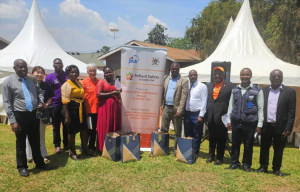Uganda commemorates 2025 world patient safety day with a call to protect every child
Jinja City. The Ministry of Health, in collaboration with the World Health Organization (WHO) and other stakeholders, commemorated World Patient Safety Day with a national event held at Mpumude Health Centre IV in eastern Uganda.
The occasion was marked under the global theme “Safe care for every newborn and every child” and the slogan “Safety from the start!”. The gathering brought together senior government officials, health development partners, civil society organizations, health care providers, educators, and community representatives to reaffirm their commitment to improving patient safety across all levels of care.
World Patient Safety Day is commemorated annually to raise awareness and drive action to prevent avoidable harm in health care. It serves as a platform to engage a wide range of stakeholders—from governments and health workers to patients and communities—in promoting safer health systems and fostering a global culture of patient safety.
This year’s theme highlights the vulnerability of newborns and children to patient safety risks and the urgent need for stronger measures to protect them from preventable harm. In 2022, approximately 2.3 million children died within the first 28 days of life, accounting for nearly half of all deaths among children under five. Sub-Saharan Africa recorded the highest neonatal mortality rate at 27 deaths per 1,000 live births, while Uganda’s rate stood at 22 per 1,000 - still above the Sustainable Development Goal target of 12.
“The Ministry of Health remains steadfast in its efforts to strengthen health systems, train health workers, and ensure that no child is left behind due to preventable harm”, said Dr Martin Ssendyona, Commissioner for Standards Compliance, Accreditation and
Patient Protection, Ministry of Health.
Most neonatal deaths occur within the first week of life, often due to inadequate quality care at birth and lack of skilled treatment in the early days. The Global Patient Safety Action Plan 2021–2030 prioritizes newborn and paediatric safety by promoting safe clinical processes, strengthening workforce competencies, engaging patients and families, and developing learning systems to prevent harm.
“We must act collectively and urgently to eliminate avoidable harm—because safe care for every newborn and every child is not a privilege, it is a right,” said Dr Kenneth Kabali, WHO Uganda’s District Field Coordinator for the Busoga Region.
Dr Kabali urged parents and caregivers to stay informed, involved, and vocal in their children’s care. Health care providers were reminded to tailor care, act early, and partner with families. Facility managers were called upon to standardize safe care and use data to improve outcomes. Policymakers were urged to embed safety into national strategies, invest in infrastructure, and promote a culture of learning. Educators were encouraged to empower children to participate in their care, while civil society organizations were asked to mobilize communities and advocate for safer care.
The commemoration aimed to achieve four key objectives: raising awareness of safety risks in paediatric and newborn care; mobilizing stakeholders to implement sustainable strategies for safer care; empowering families and children through education and active participation; and advocating for strengthened research in paediatric patient safety.
The momentum generated from this year’s observance is expected to drive sustained improvements in patient safety and contribute meaningfully to Uganda’s journey toward Universal Health Coverage.
